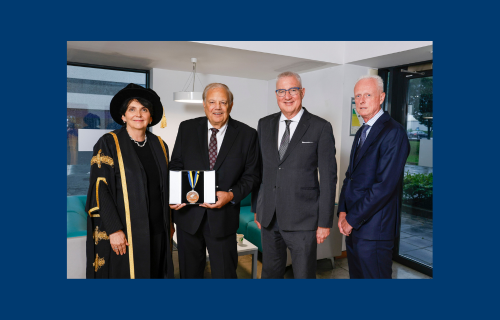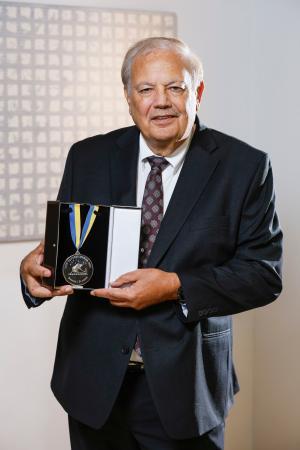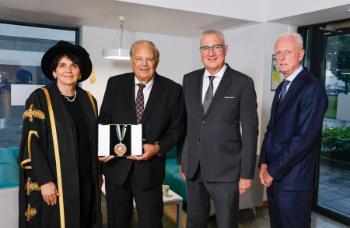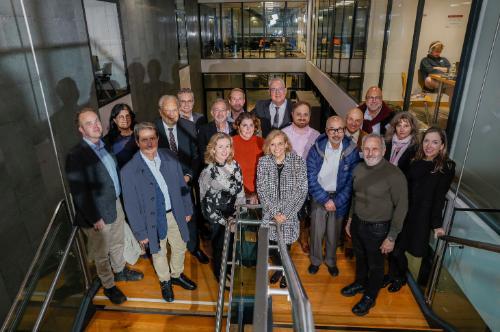UCD Ulysses Medal for US oncologist Dr Dennis Slamon who developed breast cancer drug Herceptin
Friday, 27 September, 2024
Share

 An American oncologist credited with saving the lives of hundreds of thousands of women worldwide by transforming the treatment of breast cancer, Dr Dennis Slamon, has received the UCD Ulysses Medal at an event organised by the UCD School of Medicine.
An American oncologist credited with saving the lives of hundreds of thousands of women worldwide by transforming the treatment of breast cancer, Dr Dennis Slamon, has received the UCD Ulysses Medal at an event organised by the UCD School of Medicine.
The UCD Ulysses Medal is the highest honour that the university can bestow.
The award was inaugurated in 2005, as part of the university’s 150th anniversary celebrations, to highlight the ‘creative brilliance’ of its most famous alumnus, James Joyce. It is awarded to individuals whose work has made an outstanding global contribution.
Previous recipients of the Ulysses Medal include Godfather of AI, Professor Geoffrey Hinton (2024); Booker Prize winning Canadian novelist, Margaret Atwood (2018); and world leading philosopher and social theorist, Professor Jürgen Habermas (2010).
The breast cancer drug Herceptin developed from the work of Dr Salmon is the first gene-based drug approved by the US Food and Drug Administration to fight cancer. It is now a cornerstone in the treatment of HER2-positive breast cancer.
 The events took place at UCD Health Sciences Centre and included:
The events took place at UCD Health Sciences Centre and included:
Research Talks by up-and-coming researchers, chaired by Prof Cormac Taylor:
Hiroaki Imoto - University College Dublin | UCD · Systems Biology Ireland PhD
Cell-specific models reveal conformation-specific RAF inhibitor combinations that synergistically inhibit ERK signalling in pancreatic cancer cells
Michela Coan - University College Dublin | UCD · School of Biology and Environmental Science PhD
How the Dark Matter of the Genome Could Help in the Fight Against Cancer
Darragh Flood - University College Dublin | UCD Conway Institute · School of Medicine
New insights into the regulation of glycolysis in cancer cells by hypoxia
 The Ulysses Medal was then presented to Dr Dennis Slamon with the citation delivered by Prof John Crown (SVUH).
The Ulysses Medal was then presented to Dr Dennis Slamon with the citation delivered by Prof John Crown (SVUH).
This was followed by a fireside chat, with audience Q&A.
In presenting Dr Slamon with the Ulysses Medal, UCD recognises that his pursuit of novel therapies for breast cancer for over 30 years have shaped the field of precision medicine and paved the way for other targeted therapies in oncology.
“Dr Slamon is one of the most inspirational medical research scientists at work today,” says UCD President Professor Orla Feely.
“His pioneering research resulted in the groundbreaking development of the breast cancer drug Herceptin which has proven to be a lifesaving therapy for women with HER2-positive breast cancer.”
“This therapy has saved the lives of hundreds of thousands of breast cancer patients worldwide, including an estimated 1,000 women in Ireland,” adds President Feely.
“Each and every day, several thousand women around the world begin potentially life-saving and life-prolonging treatments for breast cancer directly linked to Dr Slamon’s scientific discoveries - highlighting the incredible difference that scientific endeavour can make to our world.”
“Dr Slamon is a most worthy recipient of the UCD Ulysses Medal, the highest honour that University College Dublin can bestow,” she concludes.
In spearheading its lengthy development, Dr Slamon forged a close relationship with Professor John Crown, a Consultant Medical Oncologist at St Vincent's Hospital in Dublin, who encouraged Ireland's participation in the early Herceptin trials.
Since then, hundreds of Irish women have taken part in clinical breast cancer trials led by Slamon and the All-Ireland Cooperative Oncology Research group.
According to Professor Crown, who will deliver the citation at the award ceremony, Dr Slamon’s “contribution to cancer research is unparalleled.”
“His early research which identified the critical importance of the HER2 gene in patients with the most aggressive type of Breast cancer was initially greeted with widespread scepticism.
“However, the brilliance of his work and the doggedness of his determination succeeded in proving the importance of his findings. Drugs which have been developed as a result of this research have revolutionised the treatment of many patients with Breast cancer, and more recently other cancers.”
“In addition, he has done pioneering research in the area of oestrogen receptor positive Breast cancer; research which led to the development of an entirely new class of anti-cancer drugs, the CDK46 inhibitors,” he continues.
“Dr Slamon has been a great friend to Ireland. He has a long collaboration with St. Vincent’s Hospital Oncology Unit, UCD and DCU, mentoring some of our brightest young Irish cancer researchers.
“This Ulysses Award, the latest of many international recognitions of his contribution, is richly deserved”
Dr Slamon serves as director of the Revlon/UCLA Women's Cancer Research Program at the UCLA Jonsson Comprehensive Cancer Centre. He is also chief of the Division of Hematology/Oncology and executive vice chair for research for UCLA's Department of Medicine.
He is now co-ordinating the worldwide NATALEE study in which ribociclib is being tested as a component of the treatment for earlier stage oestrogen receptor positive breast cancer.
Between this and HER2 altered breast cancer, approximately 85% of all metastatic breast cancer patients now will receive treatments which derived originally from his work.
A 1975 honours graduate of the University of Chicago's Pritzker School of Medicine, Dr Slamon has received nearly two dozen research awards including Lasker-DeBakey Clinical Medical Research Award and the Szent-Györgyi Prize for Progress in Cancer Research.
He also won the Sjöberg Prize from the Royal Swedish Academy of Sciences and Sweden's Sjöberg Foundation, two awards that have historically been significantly predictive of subsequently winning the Nobel prize.
Also of importance: a new study published in Nature Medicine, by UCD School of Medicine's Prof Michaela Higgins, shows high response rates and good clinical outcomes provided by T-Dxd in the treatment of people with advanced HER2-positive breast cancer. To find out more, see here.